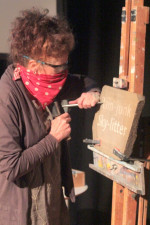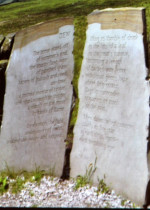'Giving something back to the landscape, whether it wanted it or not' - Simon Armitage on the Stanza Stones

Originally the plan was for one, enormous Stanza Stone - a kind of “poetic Mount Rushmore, that you could see from the moon” – but there wasn’t the budget for it, Simon Armitage told the audience at Winchester poetry festival.
He was there with letter carver Pip Hall to discuss and explain the reasoning and practicalities of a project which led to the creation of the 47-mile Stanza Stones Trail, in which six poems by Armitage were carved into rocks by Hall between the poet’s home village of Marsden, and Ilkley, home of the literature festival where the idea was born, along the South Pennines watershed.
The six stones and their poems between Marsden and ilkley are called Snow, Rain, Mist, Dew, Puddle, and Beck, after Armitage’s overarching theme, In Memory of Water, came to him. He spoke of how he reorganised and edited the poems, to fit the stones. Line breaks had to change. “I’d never written them in a fixed form, but like fabric, to be moved around, to be flexible.“

Armitage and Hall spoke about a seventh, hidden Stanza Stone, and revealed a bit more than they have done before about it. Although they disputed its size, both agreed it was fairly small and had been placed within either a “wooden casket” or “hollowed-out log”. Armitage added: “We took it to a place above Hebden Bridge, where the Ted Hughes poem ‘Six Young Men’ is set, and placed it under the riverbank there." Shortly afterwards the valley was flooded, “so we’ve no idea where it is now. It’s either in the Atlantic, or in the North Sea - or lying in someone’s cellar in Todmorden”.

Armitage said: “People have been going up there for thousands of years to carve things in the rock”, up to and including slogans like Leeds United and Kaiser Chiefs. He and Hall spoke of how the community had become involved in and has since adopted the project. Armitage had taken groups of young poets up on to the moors and urged them to collect words. It has been “eye-opening, moving and inspiring” to read their poems “or raw experience, personal insight and genuine feeling”. The Stanza Stones Trail has become a three- or four-day walk; groups have adopted individual stones, to clear away moss and lichen and generally look after them; loved ones’ ashes have been scattered around them.
The current Oxford professor of poetry talked about the moors, “my playground as a kid”, and a quarry where he would “go and misbehave …. I’ve written about that landscape so often, there was a sense of me giving something back - whether it wanted it or not.”
In the book Stanza Stones, published by Enitharmon, Armitage adds that he has been asked if he has a favourite stone of his own, and admits: “Having a poem carved not just in the village where I was born but into the side of Pule Hill, a hill which loomed large over the village of Marsden and exerted such a powerful gravity over me as a child is an extraordinary privilege.”

Norgate, who was born and grew up in Selborne, spoke of the Downs as “not always cosy. I’ve been up there in mist and rain and fog, and emotional turmoils. You face the Channel, you have the sense of being on the edge of something.” Kate Miller has written ‘A Piece of Chalk’, after GK Chesterton, and spoke of the ghost of Edward Thomas, “a great influence”. Lydia Fulleylove, from the Isle of Wight, spots a chalk hill blue butterfly, on ‘The Path to the Combe’. Zoe Mitchell’s poem ‘Seven Sisters’ was about both coastal erosion, and the end of a relationship. Hannahn Brockbank said that walking was part of her creative process: “I work to reconnect words with their locality.”
Now there’s to be a feasibility study into a South Downs poetry trail. Let’s hope it happens.
Friday night’s main reading at Winchester poetry festival was from Kim Moore, Ian Duhig, and Sophie Hannah – three poets who share an “oblique, wry view of life”, according to the Winchester festival’s chair of trustees, Stephen Boyce, who introduced them.
Kim Moore has been teaching the trumpet in schools for 13 years, but is giving it up to study for a PhD. She spoke in one poem about her mixed feelings of guilt and elation at leaving her pupils. Another, ‘The Trumpet Teacher’s Curse’, lists the frustrations of the job, including “the boy who dropped a pencil / on the bell of his trombone to see if it did / what I said it would … the class teacher who sits at the back / of the room and does her paperwork … the boy who threw up in his baritone / as it was his own personal bucket”.

Sophie Hannah’s poem, ‘The Cancellation’, celebrated her elation at being told that she did not have to go to a youth club to read poems after all; an elation that she believed was surely shared by the youth club’s teenagers, the organising librarian, the girl from the local bookshop, told to bring along books that no one would buy, and the youth club’s leader and arts worker. “Since this happened at such short notice / They would still have to pay my fee. / I parked in the nearest lay-by / And let out a loud yippee.” The poem went on to speculate how often late cancellations come as a great relief and provide moments of real joy.
Be that as it may, I’m glad – and I’m sure the rest of the Winchester audience was, too - that none of these three poets cancelled at the last minute on Friday night.
Greg Freeman
See more Winchester poetry festival pictures

Greg Freeman
Tue 11th Oct 2016 10:08
Cheers, Julian. Yes, had it not been getting dark when I arrived at Sat teatime, a brisk walk up to Pule Hill would have been just the thing, after my five-hour drive from Winchester. Would have cleared the cobwebs, and been good for my knees. Ah, well. Next time, indeed.